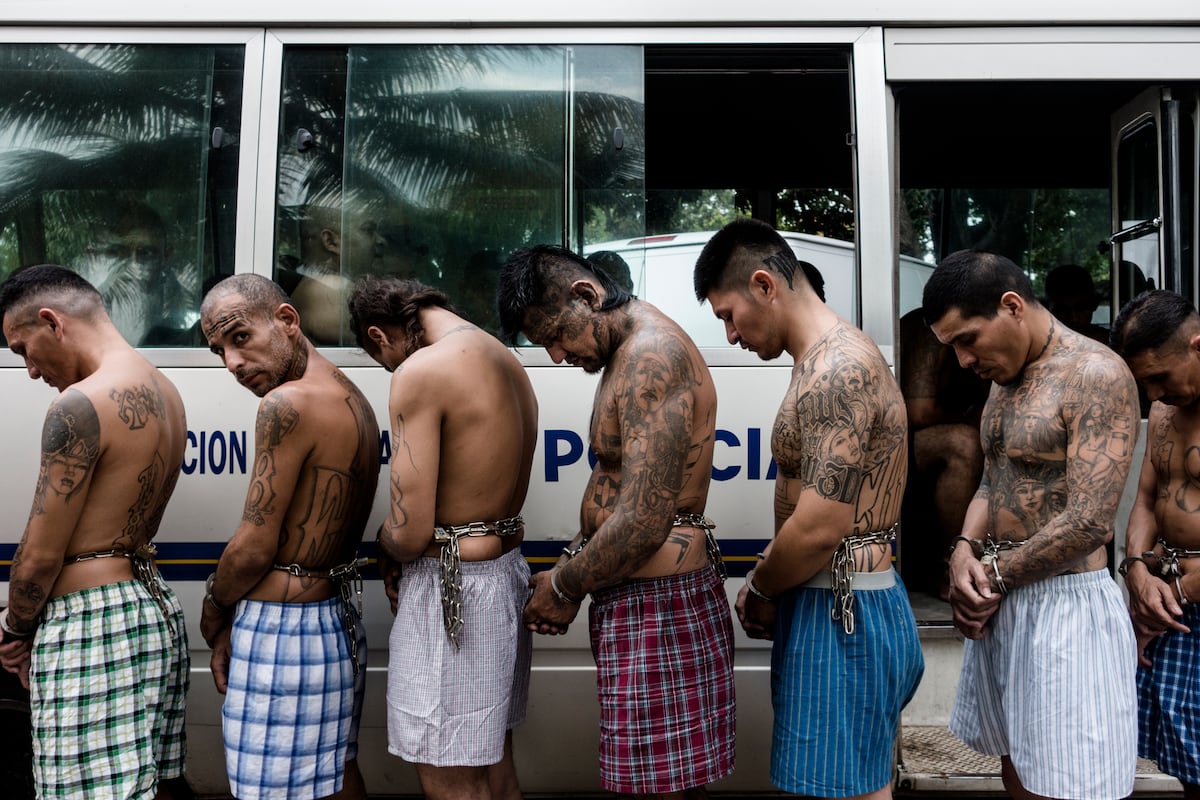A group of gang members detained in El Salvador, in a file photo. Fred Ramos (Getty Images)
Extreme overcrowding, due process violations, lack of guarantees, mass arrests and deaths in custody.
The other side of the coin in Nayib Bukele's strategy to end gangs in El Salvador has been exposed in the leak of a database to which Human Rights Watch (HRW) has had access.
The records show "large-scale abuses" in the prisons of the Central American country under the emergency regime decreed in March 2022. This measure has led to the arrest of more than 60,000 people in the last 10 months and the president has managed to weaken the two main criminal organizations, the Mara Salvatrucha-13 and Barrio-18.
At the same time, complaints of violations of human rights have multiplied.
The findings now confirm the alerts launched by both HRW and the Salvadoran NGO Cristosal.
The database, attributed by a trusted source to the Ministry of Justice and Public Security, lists the names of people prosecuted between March and August of last year.
The first conclusion, according to a statement released this Friday, is that "thousands of people, including hundreds of minors, have been detained and prosecuted for broadly defined crimes that violate basic guarantees of due process and undermine the prospects for justice for victims of gang violence.
The documentation, which was collated by HRW with other sources, records the death of 32 people up to August, mostly in the Mariona and Izalco prisons.
The authorities referred in November to the death of another 58 detainees without clarifying the circumstances.
Regarding the accusations made against the prisoners, more than 39,000 faced charges of belonging to “illicit groups” and more than 8,000 to “terrorist organization”.
Instead, the organization in defense of human rights points out, “far fewer people had been accused of violent crimes, such as homicide (148 people, that is, less than 0.3% of those arrested) or sexual assault (303 people, that is, less than 0.6%)”.
The crime of "illicit groups" in El Salvador also affects those who obtain "profit" indirectly from relations "of any nature" with gangs.
“The use of these imprecise criminal types opens the door to arbitrary arrests of people with no relevant connection to gang activities and does little to ensure justice for violent gang abuses, such as murder and rape,” HRW notes.
According to official data, the Salvadoran authorities have arrested 61,000 people since March, of whom nearly 3,000 have been released, in many cases with alternative sentences.
At the end of August, a total of 1,082 minors had been sent to pretrial detention, 21 of whom were 12 or 13 years old.
A law passed when the emergency regime came into force lowered the age to charge criminal offenses in the case of children linked to gangs from 16 to 12 years.
"This database makes it possible to corroborate serious human rights violations committed during the emergency regime," says Tamara Taraciuk Broner, acting director for the Americas at HRW.
“The data reveals that Salvadoran authorities have subjected detainees, including hundreds of children, to extreme overcrowding in overcrowded detention centers, and have done little to ensure access to justice for victims of grave abuses committed by gangs”.
This last data is bloody.
Until August 2022, the prisons of El Salvador increased their population by 50,000 people.
In February 2021, the country's prison system, according to official information, had a capacity for 30,000 people.
The leak of the database also proves "that more than 7.
Added to this situation are the poor control conditions of the Bukele government, harassment and accusations against the press and organizations dedicated to defending human rights and the obstacle course to access information of public interest.
With these premises, HRW once again requests the Executive "to replace the emergency regime with a sustainable strategy that respects human rights to address gang violence and protect the population from the abuses that they commit."
Starting, for example, by addressing the problem from its structural causes "such as high levels of poverty and social exclusion and promoting strategic criminal proceedings focused on judging gang leaders."
Follow all the international information on
and
, or in
our weekly newsletter
.

